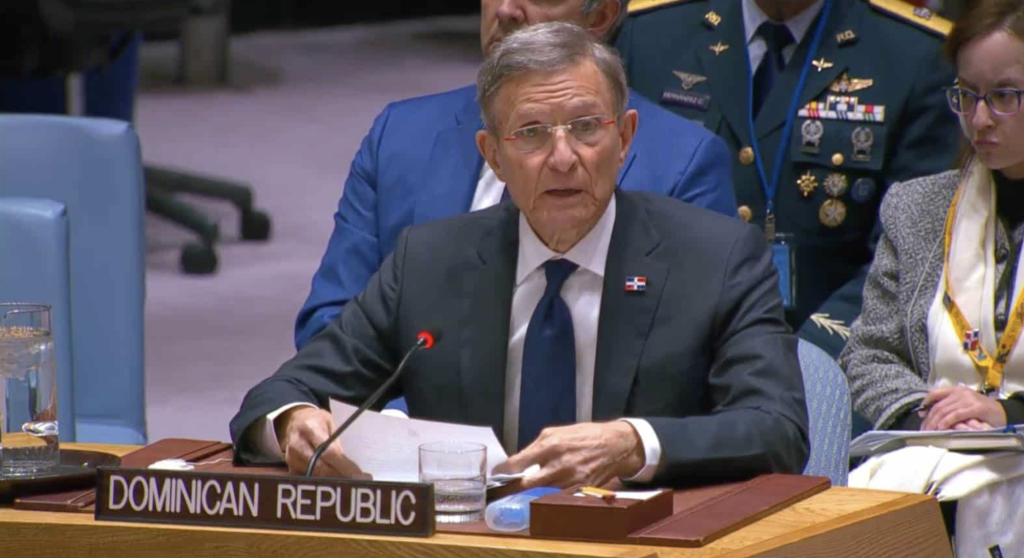
Minister of Foreign Relations Roberto Alvarez called for an end to arms supplies to Haiti and protested the intent to include known criminals in the Haiti transition government. “The present measures are not enough,” he said, when speaking at the UN Security Council meeting on 22 January 2025 at the UN headquarters in New York City.
Roberto Alvarez stated: “The time has come for this organization to take on a more effective and direct role in the pacification of Haiti, supporting the authorities of that country.”
Alvarez corroborated statements by the UN Special Representative for Haiti Maria Isabel Salvador who gave an overview of the challenges faced by the Haitian National Police (HNP) that she says remain immense. Salvador said enhanced international assistance is critical. She said the security situation has worsened at a time when instead the UN has reduced its footprint in the capital city of Port-au-Prince. So far, the National Police has added new recruits, an additional 217 Kenyan police officers, 150 Guatemalans and eight Salvadorean troops have joined the forces in Haiti.
Salvador reported on the challenges faced by the HNP with high attrition rates, insufficient specialized training, and a lack of equipment.
She also said, “While there is progress on the political front and reason to be timidly hopeful, the transition framework remains fragile. The increasing fragmentation of the political sectors represented on the Transitional Presidential Council, combined with persistent criticism of this Council, complicates the process.”
She stressed, “Over 6 million people – nearly half the population – require humanitarian assistance, with 3.9 million targeted for aid. The number of internally displaced persons has tripled to over 1 million, with more than half being children. Displacement sites are overcrowded and lack essential services such as clean water, sanitation, and education. Food insecurity affects 48% of the population.”
Ghada Fathi Waly, executive cirector of the UN Office on Drugs and Crime (UNODC) said: “The ongoing violence and instability is compounded by illicit arms flows, drug trafficking, and other illicit markets, and underpinned by corruption and money laundering.” She also said, “Haiti needs stronger capacities to register, control, and trace firearms and ammunition, including seized weapons and private stockpiles, as well as to collect, request, and analyse firearms seizure data.
Waly stated that maritime and land border control on the Haiti-Dominican Republic border needs to be enhanced with equipment, human resources, and improved information sharing. In addition, stronger controls are needed for ships departing Florida for Haiti, but also for the Bahamas and Turks and Caicos, which traffickers are now using as transit destinations.”
She added, “Airspace closures and hardline anti-migration policies in the region, as well as stricter controls in the Darien Gap and the shut-down of the international airport in Port-au-Prince are leading Haitians to take more risk to escape, using the services of migrant smugglers who are ready to put them at risk.”
Also addressing the Council, Jean-Victor Harvel Jean Baptiste, Haitian Minister for Foreign Affairs and Worship, said: “My country has requested the transformation of the Multinational Security Support (MSS) into a United Nations peacekeeping mission, equipped with a clear mandate, adequate resources, and enhanced expertise. This transition is not merely a logistical necessity but a strategic imperative to address the multiple threats facing our country.”
Read more:
23 January 2025

